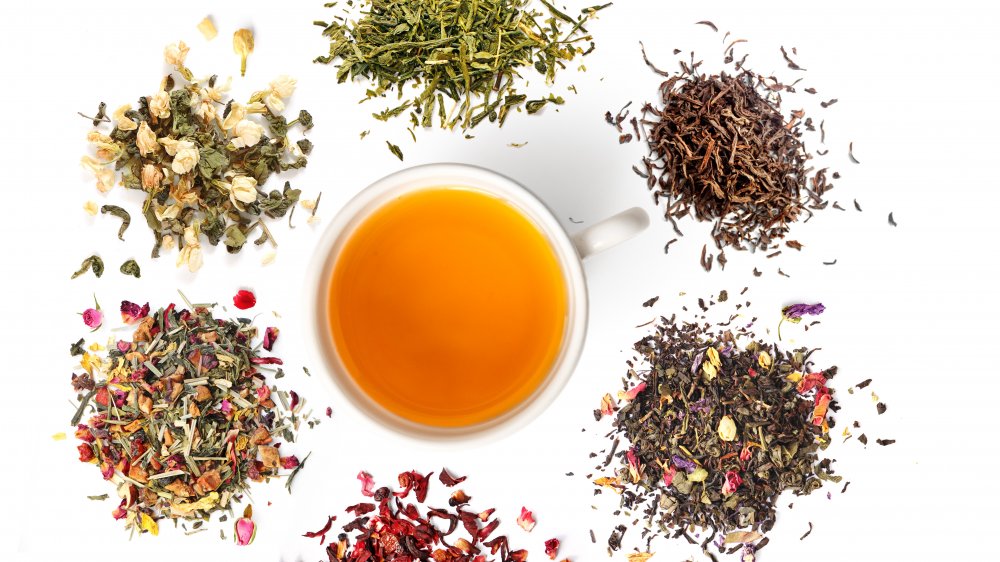This Is What Each Type Of Tea Does For Your Body
As the leaves start to turn, you may be ready to switch up your beverage routine. Luckily, when you choose tea, your body gets to enjoy the health benefits the the brew, of which nearly three billion cups are consumed around the world each day (via Mindbodygreen). Between its powerful antioxidants and anti-inflammatory properties, tea can help with a variety of ailments you may be experiencing.
While each type of tea contains different healing components, the therapeutic benefits of the drink are well documented. Helping to lower cortisol, the stress hormone, tea can offset the damaging effects of chronic stress, as well as aid in other ailments such as fatigue, indigestion, and more (via Nature). Especially when you drink tea on a long-term basis, you could be benefiting your system more than you know. Drinking a half cup of tea each day is even linked to a lower risk of developing depression and dementia.
If the health benefits aren't enough to convert you to a tea-drinker, know that you can find a tea that tastes good and fits your needs. From green to white to black, there are plenty of shades to choose from — and here's what they do for your body.
How green tea helps your body
Green tea is perhaps one of the most common types of teas and offers tons of antioxidants, flavonoids, and other illness-fighting benefits. According to WebMD, green tea improves blood flow and circulation while lowering cholesterol. Christopher Ochner, a research scientist in nutrition at Mount Sinai Hospital, even says, "It's the healthiest thing I can think of to drink."
Green tea also contains high levels of catechins, which are compounds that help prevent cell damage. Just as they help protect plants from environmental toxins, they do something similar for your body (via CleanEating). In addition to these benefits, drinking green tea also helps block the formation of plaques that are linked to Alzheimer's (via WebMD). And if you're looking to boost your body's ability to absorb these healthy molecules, add some lemon for a dose of Vitamin C, which enhances the benefits of the catechins.
Green tea also increases your metabolic rate, meaning that it burns calories and helps with weight management (via Healthline). With all of these benefits, it's easy to see why green tea is a staple in millions of people's routines.
How white tea helps your body
Much like its counterpart, green tea, white tea offers a flood of antioxidants and catechins. Helping to fight disease-creating free radicals, white tea reduces inflammation and the issues that it can cause throughout the body (via Healthline). Since inflammation is the root cause of many common diseases, drinking this type of tea can help prevent illnesses like cancer, heart disease, and autoimmune conditions.
In one study, researchers found that white tea extract suppressed the growth of colon cancer cells and stopped them from spreading (via Healthline). Plus, white tea comes in different flavors that you can choose to fit your taste buds. It has less caffeine than other traditional teas, so if you're looking to kick your caffeine habit, white tea can be a powerful, healthy ally (via VeryWellFit).
How black tea helps your body
Black tea has long served as a morning staple in Britain and other tea-drinking areas of the world. A heavily-caffeinated tea, black tea's polyphenols can help heal your gut lining (via Well+Good). As more studies show the correlation between gut health and immune system health, it's a good idea to take note of ways you can care for your digestive system. Properties in black tea promote the growth of good bacteria while slowing the expansion of the bad in your intestines (via Healthline). As if that wasn't enough to help your system, black tea's antimicrobial properties can reduce harmful substances in your gut while repairing the lining in your digestive tract.
On top of healing your digestive system, black tea can help with stress. New studies show that daily cups of black tea actually reduce levels of stress hormones like cortisol (via EliteDaily). Even more compelling, one study found that after drinking black tea for a six-week period and being exposed to a stressful event, those who were drinking the tea experienced a decline in cortisol levels faster than those who hadn't. Basically, when you're drinking black tea, not only are your stress hormones lower than normal, they can drop more quickly after a stressful event.
As the weather gets cooler and you look for a warm companion, brew a cup of tea for a sense of comfort — and a host of health benefits.



